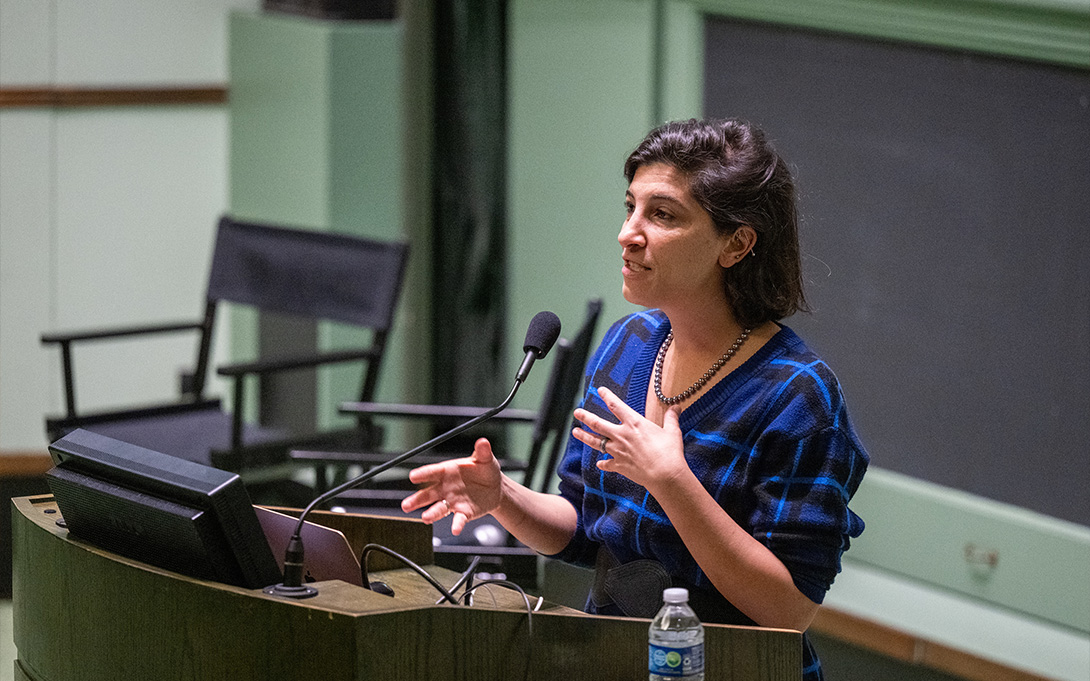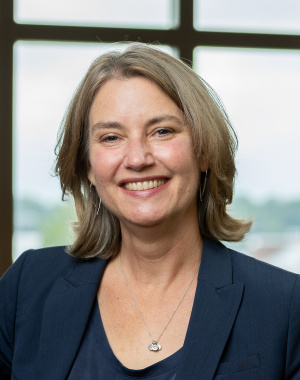
How did one unsubstantiated Facebook group post accusing Haitian immigrants of eating pets in Springfield, Ohio travel all the way to the Presidential debate stage and ultimately provoke bomb and death threats against innocent Ohio residents? Digital scholar and former researcher at the Stanford Internet Observatory Reneé DiResta believes this story exemplifies an emerging pattern of information manipulation online, where interactions between ordinary people, media, and political elites combine to drive the news cycle and shape our perceptions of reality. At a keynote speech hosted by the University of Michigan’s Rackham Graduate School and the Ford School of Public Policy, DiResta laid out the dangers of this digital “rumor mill” and what - if anything - we can do to mitigate it. The talk was part of Rackham’s annual Gupta Professional Ethics series.
DiResta explained that the distinctive qualities of “rumors” - unverified accounts that travel from person to person and often challenge official narratives - more accurately capture online behavior than the traditional term “misinformation.” Propagandists have adapted to this new social media ecosystem by picking up and manipulating these rumors to serve their own ends. “What happens online isn’t staying online,” DiResta warned. “The intersection of the rumor mill, the propaganda machine, and the harassment and the actual threats that often accompany a blowback that are actually part and parcel to it has become unfortunately….quite a normal process in which people make sense of the world today.”
The rumor mill’s vicious cycle is far from abstract to DiResta, who experienced its direct consequences while fighting the anti-vaccine movement in California and researching efforts to delegitimize the 2020 presidential election. She argued that California’s institutions’ failure to curb anti-vax sentiment was a product of institutions’ unwillingness to engage online: “Public health experts were very dismissive of the idea that they needed to be a part of this opinion-shaping universe….they thought that people would still trust authority, would trust their doctors, because that’s just what people do. But they do not, and the institutions got it wrong.” According to DiResta, experts are struggling to compete for attention in an information economy where “the power to influence opinions increasingly lies with those who can most widely and effectively disseminate a message” rather than those with the highest qualifications or the most experience.
In the aftermath of Elon Musk’s acquisition of Twitter, the Stanford Internet Observatory faced a barrage of right-wing attacks claiming that their nonpartisan research for the Election Integrity Partnership amounted to “government censorship” that had swayed the results of the 2020 election. Finding herself subject to the same tactics of demonization that she had built her career studying, DiResta realized just how effective this digital playbook has become: “The purpose of running these kinds of smear campaigns is to target researchers and to silence them; it’s to render certain types of work dangerous, not worth doing; to erode the protection of academic freedom and to stifle the free speech of political enemies through intimidation campaigns.”
The grassroots nature of the rumor mill lends power to its iniquitous effects; however, DiResta believes this quasi-democratic structure is also the key to defanging it. “Unlike in authoritarian regimes, our misinformation, our rumor mill is not necessarily imposed upon us - we are quite voluntarily and cooperatively embracing it. This is what we see as normal now - algorithms and media outlets happily supply content that echoes our preferences and enables us to construct, brick-by-brick our own political, social, and religious realities.” Nonetheless, if we are making decisions every day to reinforce these destructive patterns, we also have the power to make decisions that will dismantle them. DiResta believes the responsibility to change our information is not limited to political elites or social media companies - it also lies with each and every one of us. “We all have a role to play in reclaiming truth and accountability in a world where fragmented information flows and decentralized power shape reality,” she concluded. “We all must commit to building a shared reality that prioritizes accuracy over spectacle and integrity over mere influence.”
